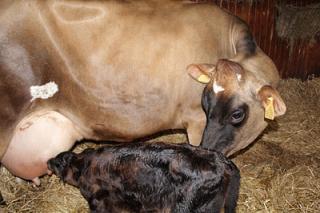Mothers Matter: Identifying Best Practice Management for Pregnant Livestock
Published on 27 January 2014 in Food, health and wellbeing

Introduction
Previous research has shown that maternal nutrition, stress or ill health during pregnancy can affect how animals develop before birth, with implications for their later life. In farm animals, maternal well being may therefore be an important contributor to health, welfare and productivity, and paying closer attention to gestation management could benefit UK farms.
Whilst research in many species suggests that the prenatal period can be important, little effort has been made to assess the degree to which maternal management could be contributing to progeny outcomes under real farming conditions. As a consequence, no information is available for farmers or other industry stakeholders as to which maternal factors could be important from a prenatal development perspective.
Key Points
SRUC, supported by Defra and the Scottish Government (SPASE), conducted a risk assessment of prenatal hazards to progeny animal health and welfare outcomes. The project delivered:
- A unique database documenting detailed outcomes from research examining early life effects in sheep, cattle, pigs, poultry and farmed fish.
- Unique information on routine management practices for breeding sheep, cattle (beef and dairy), and pigs in the UK.
- A comprehensive assessment of the probability that maternal state during gestation is affecting progeny welfare on UK farms.
- An evaluation of knowledge gaps within the field of prenatal effects on livestock welfare, specifically from an applied perspective.
Maternal disease (both viral and bacterial) ranked highly as a risk to optimal fetal development in cattle, pigs and sheep. For pigs, the hazards ranked most highly were social mixing, competition for feed and poisoning (mycotoxin exposure). Important hazards for negative offspring outcomes for dairy cattle were housing system, poor pain management, handling and restraint, social mixing, lameness and drying off procedures. For beef cattle, weaning stress, competition for feed, social mixing, handling and restraint, and feed restriction after weaning ranked highly as negative prenatal hazards. In sheep, exposure to winter weather/cold stress, dental problems, and under-nutrition/low body condition score were identified as risks to prenatal development.
Research Undertaken
The focus of the risk assessment was the influence of maternal state on progeny postnatal biology. The primary outcomes of interest were parameters relating to animal welfare, including health. The first phase of the study identified possible hazards in farm management of beef and dairy cattle, sheep, pigs, fish (salmon and trout) and poultry (broiler and layer). A comprehensive, structured literature search was conducted and 575 peer-reviewed studies were identified as relevant. The information from the literature review, along with expert opinion contributed to the generation of a list of possible hazards for each animal group.
The second phase of the project captured new information on the extent to which livestock in the UK are exposed to the identified hazards. A postal survey of farm management practices for breeding animals (sheep, pigs, dairy and beef cattle) was conducted across the UK. Beef and sheep farms across Great Britain were also visited to collect additional information on hazard exposure. The estimated likelihood of hazards exerting a prenatal effect on postnatal animal welfare was combined with exposure estimates (data gathered during the project, and from other sources) to formulate an overall rating of the probability that progeny welfare could be impaired following exposure to each individual hazard. The risk rating ultimately represents the probability that the hazard concerned is having a negative effect on health or welfare in that species under current UK farming conditions.
Policy Implications
Attending to gestation management could allow farmers to give their stock a head start at birth. Several important factors in UK livestock management (husbandry, health, housing, feeding), which could be reducing animal health, welfare and productivity through altered fetal development, and impaired postnatal viability, have been identified. Aspects of farm management during the gestation period could be optimised by farm managers to improve performance and animal care.
Future research should aim to more closely replicate relevant commercial practices, and directly address issues that could benefit the UK livestock industry. Scientifically, this topic is large and complex and, with so many options for research, it would never be possible to conduct all possible experiments. Risk assessment can function by directing research towards the priority topics.
Author
Dr Kenny Rutherford kenny.rutherford@sruc.ac.uk







